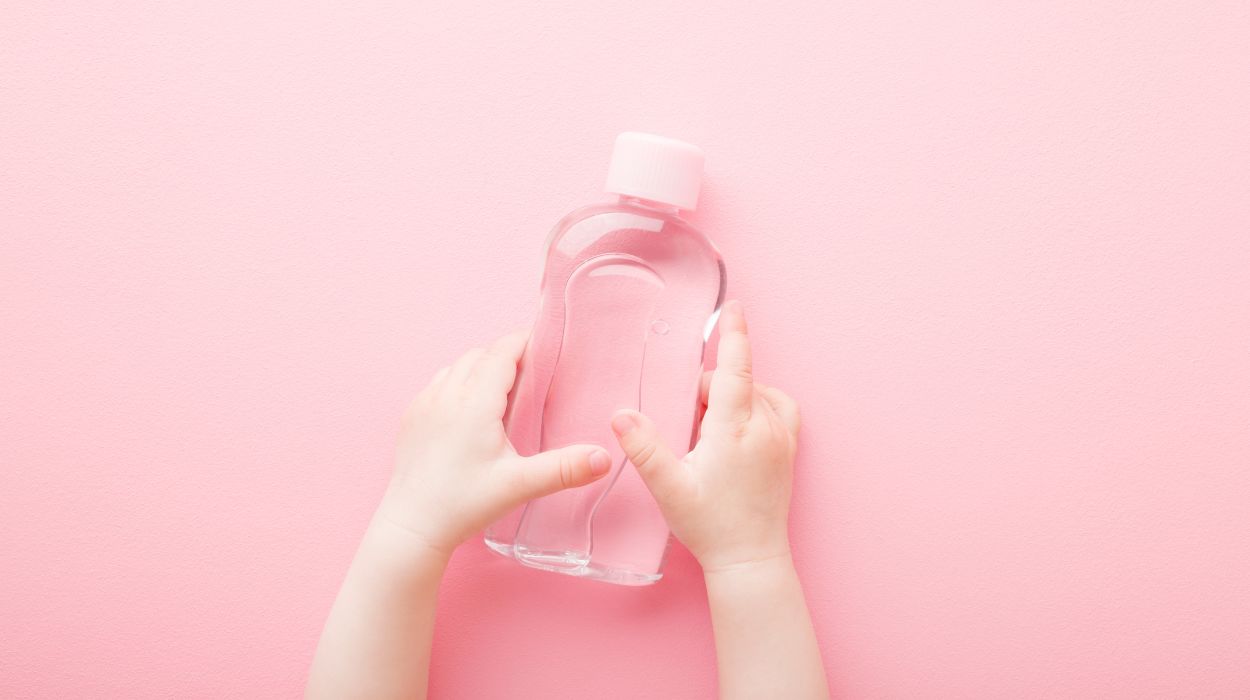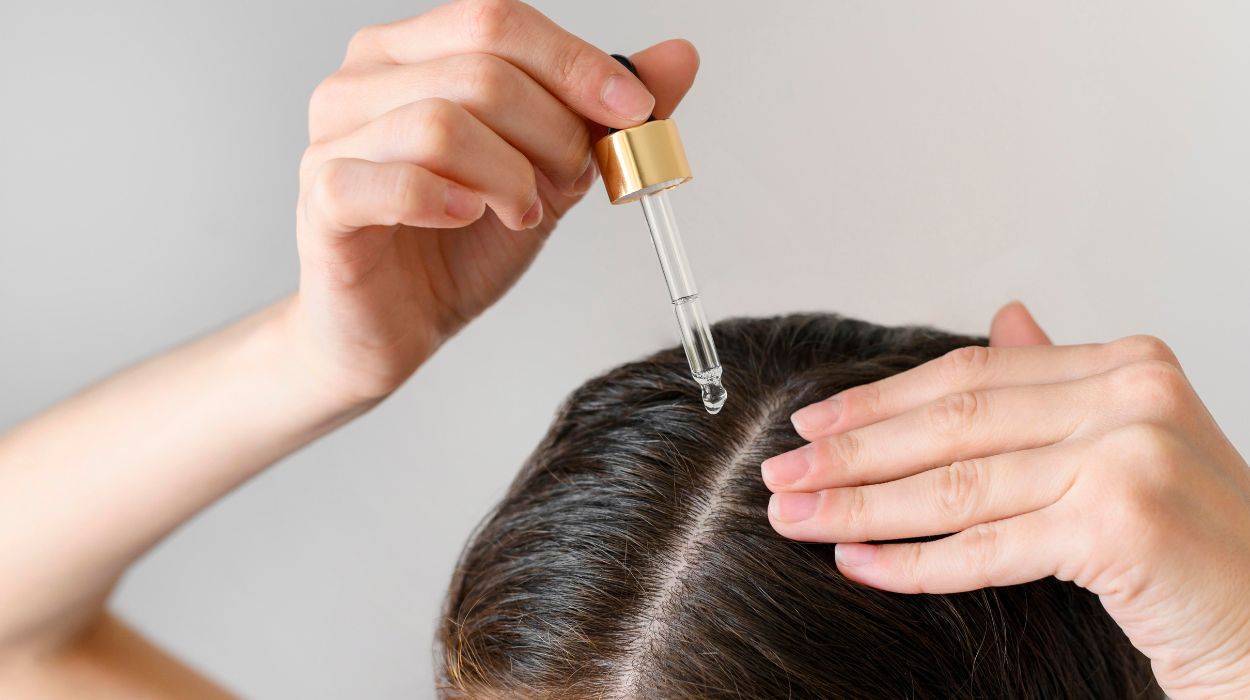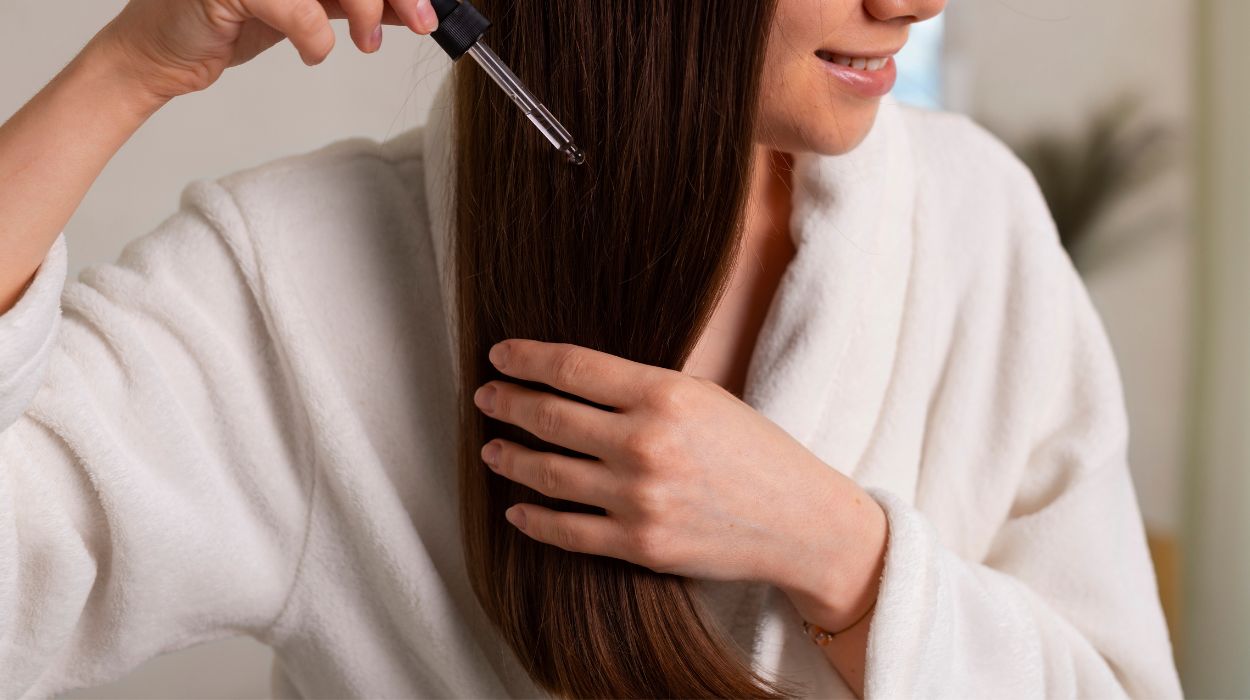 Expert's opinion
Expert's opinion
Expert's opinion
The article is a subjective view on this topic written by writers specializing in medical writing.
It may reflect on a personal journey surrounding struggles with an illness or medical condition, involve product comparisons, diet considerations, or other health-related opinions.
Although the view is entirely that of the writer, it is based on academic experiences and scientific research they have conducted; it is fact-checked by a team of degreed medical experts, and validated by sources attached to the article.
The numbers in parenthesis (1,2,3) will take you to clickable links to related scientific papers.
Is Baby Oil Good For Your Hair? Benefits, Uses & Risks In 2024

Who doesn’t want a head full of luscious and healthy hair? To achieve this goal, people seek a range of products that give their hair shine and volume, including shampoos, conditioners, serums, and oils for hair. In addition to the usual list of popular cosmetics in the beauty industry, baby oil is another simple, cheap, and potentially effective option. But is baby oil good for your hair?
It turns out that this unlikely product may help tame dry and messy hair, promote a healthy scalp, and even protect your hair against certain cosmetic chemicals. Keep reading to learn how baby oil can benefit your hair, how to use it, and some risk factors to keep in mind.
Can You Put Baby Oil In Your Hair?
Yes, baby oil contains mineral oil and sometimes other botanical ingredients. While mostly used to moisturize skin, early research suggests baby oil can help soothe a sore scalp and assist hair growth. Many people use the product to protect their hair, combat frizz, and flyaways, and prevent damage. There are many uses for baby oil in the hair. It can serve as a pre-shampoo before washing, as a conditioner, and as an overnight application.
Is Baby Oil Good For Your Hair?
Baby oil is a common product that parents use when their baby’s skin flares up. The most abundant ingredient in most baby oil formulas is mineral oil, a clear and odorless substance collected as a byproduct during the processing of crude oil. By refining this byproduct, companies can make a safe topical that doesn’t cause irritation or allergies in most children or adults.
Many people wonder about the effectiveness of using baby oil on their hair. While it may seem unconventional, baby oil can offer several benefits for hair care. Rich in mineral oil and often infused with vitamins, baby oil can help moisturize and soften the hair, reduce frizz, and add shine. However, those with sensitive skin or allergies should be cautious and perform a patch test before incorporating baby oil into their hair care routine.
Top Benefits Of Baby Oil On Hair
Like many superfoods for hair and other healthy hair products, baby oil can contribute to healthier-looking locks and may even promote hair growth.
Overall, baby oil may be worth adding to your hair care routine as it can:
Baby Oil Helps To Strengthen Hair
Hair, especially when damaged, is highly porous.[1] Every strand is covered in tiny holes that absorb water and apply chemicals that can cause further damage, such as hair dye.
Using baby oil before shampooing or dying your hair can help reduce hair porosity and prevent damage. The molecules in baby oil are too big to enter the small holes in your hair strands. Instead, they work to seal the holes and prevent smaller chemicals from being absorbed.
Baby Oil Moisturizes Hair
In addition to keeping potentially harmful chemicals out of your hair strands, baby oil can also help prevent moisture loss. Manufacturers claim that the mineral oil found in baby oil products can act as a skin moisturizer, locking in water. This mechanism may also apply to your hair.
Treating your hair with baby oil before exposing it to hot air from a blow dryer may reduce frizz and protect it from damage over time.
Baby Oil Tames Frizz And Flyaways
Looking for more ways to use baby oil in your natural hair? You can also incorporate it into your styling routine to help you maintain a neater look. Frizzy hair typically occurs when the outer layer of a hair strand becomes dry or damaged. Flyaways, on the other hand, indicate that broken hair or smaller hair strands are starting to lengthen.
Baby oil has gained popularity for combating rouge and messy hair. Just a few drops of baby oil can tackle both issues by creating a barrier against humidity and enhancing hair smoothness.
While scientific research remains limited, many people have found that mineral oil helps their hair’s appearance by making it smoother and shinier.
Baby Oil Soothes An Irritated Scalp

Several underlying causes may be responsible for scalp irritation, including dandruff, scalp psoriasis, and atopic dermatitis. Research shows that applying baby oil reduces the severity of diaper dermatitis in babies. As a moisturizing and soothing emollient, baby oil can also help promote a healthy scalp.
The National Eczema Society suggests parting the hair and massaging emollients directly onto the scalp. Massaging the scalp can stimulate the production of natural oils, which can also help maintain moisture in your hair.
Baby Oil May Accelerate Hair Growth

Like other hair supplements, some baby oil formulas may assist with hair growth. Current research regarding mineral oils and hair growth is limited. However, several formulas contain aloe vera and licorice, which have shown the potential to promote hair growth. Research shows that a hair tonic consisting of ethanol, aloe vera, and licorice worked as a hair fertilizer[2] in rabbits. However, further research is needed to test their efficacy in humans.
How To Use Baby Oil For Hair Growth
So, can you put baby oil in your hair? Early research suggests that baby oil is a promising cosmetic for hair protection, moisturization, and growth. But how exactly should you use it? Consider these options and decide which method best fits your needs:
Deep Conditioning Treatment
Baby oil can be a leave-in conditioner, perfect for your wash days. Apply 1–2 tablespoons of baby oil to your hair, cover, and leave in place for approximately two hours before showering.
Pre-Shampoo Treatment
Use enough baby oil to evenly coat your hair roots and parched hair ends. Leave it in place for 15 minutes before washing.
Using Baby Oil In Hair Overnight
Starting with dry hair, rub a small amount of baby oil between your hands. Gently massage the oil onto your scalp and along your hair towards the ends. Cover your hair with a towel or shower cap overnight and wash thoroughly in the morning with shampoo.
Risk Factors To Keep In Mind
While baby oils may offer several benefits, it’s important to consider their potential risk factors. Although rare, these may include:
Skin Irritation
Baby oil can cause irritation and an allergic skin reaction in people with sensitive skin. Complete a test patch by applying a small amount to a specific area of your skin to see how it reacts before applying more liberally to your hair and scalp.
Eye Irritation
Keep baby oil away from your eyes. If your eyes come in contact with baby oil, rinse immediately with water and seek medical attention as required. To prevent this, avoid using too much oil at one time.
Other Allergies
A 2021 study found an association between moisturizer use and the development of food allergies[3] in infants.
Alternatives To Baby Oil
If using baby oils irritates your skin, you may need to consider alternatives to help you achieve your desired fullness and shine. After discussing them with your dermatologist, consider using plant oils, such as:
- Coconut oil: Research[4] shows coconut oil may help to enrich beneficial microorganisms that live on the scalp.
- Argan oil: Rich in fatty acids and phenolic compounds, argan oil helps to protect hair[5] against oxidative damage.
- Jojoba oil: This natural oil may help to promote hair growth.[6]
The Bottom Line
So, is baby oil good for your hair? While scientific research is limited, early studies suggest that using baby oil for hair can soothe the scalp, prevent breakage, and potentially boost healthy hair growth. Additionally, many users have shared anecdotally that baby oil adds volume and shine while taming frizz.
Whether you have damaged, dry, and brittle hair or you simply want to maintain your healthy locks, baby oil may be worth a try. There are several ways to use the product, allowing you to incorporate baby oil into your routine in a way that serves your hair best.
+ 6 sources
Health Canal avoids using tertiary references. We have strict sourcing guidelines and rely on peer-reviewed studies, academic researches from medical associations and institutions. To ensure the accuracy of articles in Health Canal, you can read more about the editorial process here
- Maria Inês Dias (2015). Hair cosmetics: An overview. [online] 7(1), pp.2–2. doi:https://doi.org/10.4103/0974-7753.153450.
- Sulistiorini Indriaty, Teti Indrawati and Taurhesia, S. (2018). Formulation and test activities of hair tonic with a combination of the aqueous extracts of aloe vera (… [online] ResearchGate. Available at: https://www.researchgate.net/publication/328658406_Formulation_and_test_activities_of_hair_tonic_with_a_combination_of_the_aqueous_extracts_of_aloe_vera_Aloe_vera_L_and_licorice_Glycyrrhiza_glabra_L
- Perkin, M.R., Logan, K., Marrs, T., Radulovic, S., Craven, J., Boyle, R.J., Chalmers, J.R., Williams, H.C., Versteeg, S.A., Ronald van Ree, Lack, G., Flohr, C., Young, L., Offord, V., DeSousa, M., Cullen, J.K., Taylor, K., Tseng, A., Raji, B. and Byrom, S. (2021). Association of frequent moisturizer use in early infancy with the development of food allergy. [online] 147(3), pp.967-976.e1. doi:https://doi.org/10.1016/j.jaci.2020.10.044.
- Saxena, R., Mittal, P., Cécile Clavaud, Dhakan, D.B., Roy, N., Breton, L., Misra, N. and Sharma, V. (2021). Longitudinal study of the scalp microbiome suggests coconut oil to enrich healthy scalp commensals. [online] 11(1). doi:https://doi.org/10.1038/s41598-021-86454-1.
- Sharifi, N., Sanaz Hamedeyazdan, Javad Shokri and Farnaz Monajjemzadeh (2022). Argan oil as a pretreatment of human hair before exposure to oxidative damage: Attenuated total reflectance and protein loss studies. [online] 21(10), pp.5010–5017. doi:https://doi.org/10.1111/jocd.14885.
- Luca Casettari, Roberts, A., Hamzi, S.H., Gad, H.A., Ilham Touiss, Altyar, A.E., Osama Adnan Kensara and Ashour, M.L. (2021). Jojoba Oil: An Updated Comprehensive Review on Chemistry, Pharmaceutical Uses, and Toxicity. [online] 13(11), pp.1711–1711. doi:https://doi.org/10.3390/polym13111711.



